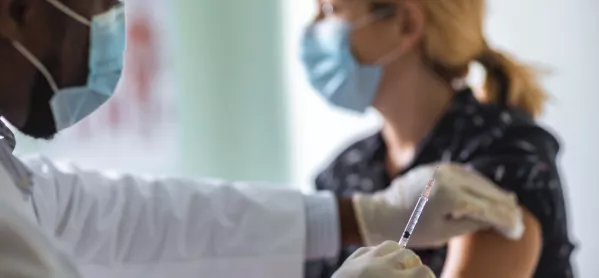Teachers and other school staff will not be prioritised for Covid vaccines as part of the second phase, the government has said.
The Joint Committee on Vaccination and Immunisation (JCVI) has agreed that targeting people by occupation after priority groups one to nine have received their first dose of the jab “would be more complex to deliver” and “may slow down” the programme, according to Public Health England (PHE).
Instead, “an age-based approach remains the most effective way of reducing death and hospitalisation from Covid-19”, it said.
Covid: Gavin Williamson ‘fighting tooth and nail’ on teacher vaccine
Vaccine row: When should school staff get jabs?
Poll: Nearly half of public want teachers to get vaccine next
Once all at-risk groups in Phase 1 have received at least one dose of the vaccine, prioritisation will continue in the following order:
- All those aged 40-49 years
- All those aged 30-39 years
- All those aged 18-29 years
The decision comes after calls from scientists, ministers and unions for school staff to be prioritised for vaccines as part of the second phase.
Covid: Calls for teachers to get vaccine priority
Back in December, Unicef called for teachers to be prioritised for the vaccine after frontline health personnel and high-risk populations, in order to keep schools open.
Then in January, health secretary Matt Hancock said there was a “strong case” for teachers to be bumped up the queue.
Education secretary Gavin Williamson also said earlier this year that he was fighting “tooth and nail” to ensure that teachers were moved up the list.
And both the NEU teaching union and the NAHT school leaders’ union have said that school staff should get the jab as a “priority”.
Earlier this month, a senior scientist called for teachers and school staff to be vaccinated early against Covid-19, saying it would only take a day to do so.
A recent poll by Ipsos MORI also showed that almost half of Britons believed teachers and nursery workers should be next in line to receive the vaccine.
In a statement on the JCVI’s recommendations, released this morning, PHE said: “The committee agreed that mass vaccination targeting occupational groups would be more complex to deliver and may slow down the vaccine programme, leaving some more vulnerable people at higher risk unvaccinated for longer.
“Operationally, simple and easy-to-deliver programmes are critical for rapid deployment and high vaccine uptake.”
Wei Shen Lim, Covid-19 chair for the JCVI, said: “Vaccinations stop people from dying, and the current strategy is to prioritise those who are more likely to have severe outcomes and die from Covid-19.
“The evidence is clear that the risk of hospitalisation and death increases with age. The vaccination programme is a huge success and continuing the age-based rollout will provide the greatest benefit in the shortest time, including to those in occupations at a higher risk of exposure.”
Mary Ramsay, head of immunisations at PHE, said: “Delivering a vaccination programme on this scale is incredibly complex and the JCVI’s advice will help us continue protecting individuals from the risk of hospitalisation at pace.
“The age-based approach will ensure more people are protected more quickly. It is crucial that those at higher risk - including men and BAME [black, Asian and/or miniority ethnic] communities - are encouraged to take the vaccine, and that local health systems are fully engaged and reaching out to underserved communities to ensure they can access the vaccine.”
